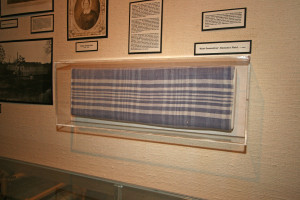Following the events of the Kirk-Holden “War”, Alamance County’s history turns, again, to the mills that dominated its economic landscape prior to the Civil War. New mills meant new jobs, even in the turbulent economic periods of the Long Depression of 1873-1897.
Several mills opened between the end of the Civil War and the end of the Century. Many of these mills still made use of the water for power and other uses. However, the advent of electrical power and the introduction of advances in transportation technology, including the continued advance of the nation’s railroads all worked together to help the Alamance County economy move strongly through the end of the nineteenth century. The first steam-powered mill opened in the county in 1882. Many of these mills are now closed, but many have been turned into new opportunities for business, tourism, and homes.
The mills also used advances in textile technology to make money and provide jobs. The Alamance Plaids that had been developed in the late 1850’s were now being made in great amounts and remained very popular until World War II. The demand for these low-cost high-demand textiles meant that the mills needed more employees. The companies that ran these mills – mostly local businessmen – built housing developments around their mills so that their employees would have a place to live, work, and build their families.

Along with the growth in the mills came new towns and cities. The North Carolina Railroad had been purchased by the Richmond and Danville Railroad and the repair facilities had been moved from Company Shops to Manchester, Virginia. The residents of the area, however, had new work in the form of the growing mill industries, and decided to rename their city from Company Shops to Burlington. Gibsonville was incorporated in 1871 around another depot that had been built on the North Carolina Railroad.
The railroad was not the only source of growth. The mill towns – some of them unincorporated – of Altamahaw, Ossipee, Glencoe, Haw River, Alamance, Bellmont, Swepsonville, and Saxapahaw all grew around the mills that provided jobs for so many. The Town of Mebanesville was established in 1881 around both the mill in the area and the railroad that went through it.
In 1889, the North Carolina Legislature issued a charter for the founding of a new college to be called “Elon College”. Today, Elon University is one of the most prestigious universities in the United States, and has received Presidents, Prime Ministers, and Nobel Prize winners as its guests.
This pattern of life and growth continued through the Great Depression. While the economy of the area was hit as hard as many other areas in the country, Alamance County seemed to suffer less. The mills had jobs and the farms still produced agriculture, and the area provided both to many who needed them.
